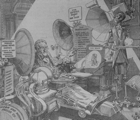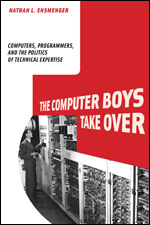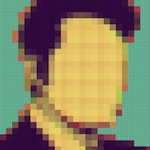September 03, 2010
#teaching

Certain new technologies are greeted with claims that, for good or ill, they must
transform our society. The two most recent: the computer and the Internet. But
the series of social, economic, and technological developments that underlie
what is often called the “Information Revolution” include much more than just
the computer. In this course, we examine what made this series of develop-
ments seem so revolutionary, who said what about them, and why. We chart
changing perceptions of information technologies as people begin to experience
them as a part of everyday life and work. We will explore both the technologies
themselves as well as their larger social, economic, and political context.These
perspectives will inform our discussion of current issues such as life and censor-
ship in ‘cyberspace’.
STSC 160 Syllabus
August 21, 2010
#publications

The “computer revolution” of the mid-20th century is widely considered to be one of the defining moments of contemporary history. And yet very little is known about its principal revolutionaries, the computer programmers, systems analysts, and other technical experts who made possible the computerization of modern society. The story of how the “computer boys” took over, how they constructed for themselves a professional identity, and how they were simultaneously admired and resented by their corporate peers and employers, reveals the complex relationship between technological innovation, organizational politics, and social disruption that continue to define the relationship between computers and society.
Learn more about the book from MIT Press. Order it on Amazon. The website for the book can be found at thecomputerboys.com.
February 22, 2010
#media

Academic careers are based on reputation, and for younger scholars at least part of that reputation is based on your online persona. But online personas are notoriously difficult to manage — unlike other forms of self-presentation, your online presence is only partially under your control.
On Monday, February 22, I will be speaking at the Graduate Student Center on the topic of managing your digital persona. Free lunch!
December 10, 2009
#media
#teaching

In the last lecture of my Information Age course, I discussed the problem of privacy in the Internet era. As one of my examples, I referred to the popular campus blog Sleeping in Van Pelt which posts pictures of people – you guessed it – sleeping in Van Pelt Library. The next day, the site Sleeping in Van Pelt featured a picture of me lecturing in front of a huge video screen featuring an image of the website Sleeping in Van Pelt.
You see where this is going: next year, a website featuring me showing a picture of the website showing me showing a picture of the website…
An infinite number of ensmengers, going all the way down…
October 15, 2009
#research
Like many terms of art in electronic computing, the concept of the “operating system” represents an appropriation of earlier, pre-computer processes and procedures. Today, of course, we think of an operating system – such as Windows, Linux, or OS X – exclusively as a type of software (indeed, as the original, irreducible essence of software). And yet through much of early decades of electronic computing, the “operating system” was only part of a larger socio-technical system of operations involved in electronic computing.
In this paper presented at the recent Society for the History of Technology Conference, explores the complex system of operations that surrounded most corporate computing efforts in the first decades of electronic computing. Here are the slides.
August 05, 2009
#media
This week I will be attending the IEEE Conference on the History of Technical Societies. This is part of a larger celebration of the IEEE’s 125th Anniversary. I gave a talk entitled “Engineering a Professional Identity: The Place of Professional Societies in the History of Computing.”
June 05, 2009
#media
This week I will be in Copenhagen to comment on papers for a conference on information technology and work processes. An excellent program of papers on everything from software development practices to the history of computing in the banking industry. The full program can be found here.
April 15, 2009
#research
For a recent graduate seminar run by my friend and colleague John Tresch, I prepared an essay on the economic principles embedded in Godwin’s Law. The result was a very rough thought piece, but a lot of fun to write. So, I present for your consideration On the Internet, Everyone is a Crypto-Fascist
April 13, 2009
#media

On Tuesday, April 14, I will be responding to a screening of the documentary “To Dream Tomorrow,” which is about computing pioneer Ada Byron Lovelace, who is often referred to as the first computer programmer.
The film is been shown as part of a series called Women of Power, which includes documentaries about Hildegard of Bingen and the botanist Maria Sibylla Merian.
More information about the Lovelace documentary and its filmmakers can be found here.
February 20, 2009
#publications
Nathan Ensmenger, “Software as History Embodied,” IEEE Annals of the History of Computing 31:1 (2009), 88-91.
Download the pdf.





